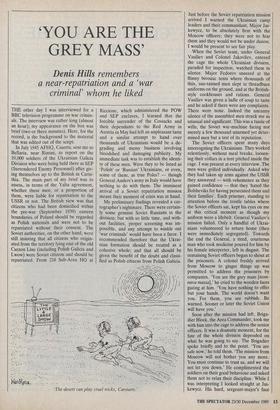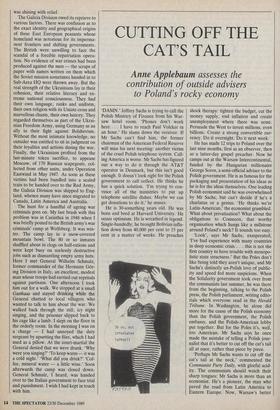`YOU ARE THE GREY MASS'
Denis Hills remembers Denis Hills remembers
a near-repatriation and a 'war criminal' whom he liked
THE other day I was interviewed for a BBC television programme on war crimin- als. The interview was rather long (almost an hour); my appearance on the box was brief (two or three minutes). Here, for the record, is the background to the material that was edited out of the script.
In July 1945 AFHQ, Caserta, sent me to Bellaria, near Rimini, to report on the 10,000 soldiers of the Ukrainian Galicia Division who were being held there as SEP (Surrendered Enemy Personnel) after giv- ing themselves up to the British in Carin- thia. The main part of my brief was to assess, in terms of the Yalta agreement, whether these men, or a proportion of them, were liable for repatriation to the USSR or not. The British view was that citizens who had been domicilied within the pre-war (September 1939) eastern boundaries of Poland should be regarded as Polish nationals and were not to be repatriated without their consent. The Soviet authorities, on the other hand, were still insisting that all citizens who origin- ated from the territory tying east of the old Curzon Line (including Polish Galicia and Lwow) were Soviet citizens and should be repatriated. From 218 Sub-Area HQ at Riccione, which administered the POW and SEP enclaves, I learned that the forcible surrender of the Cossacks and their dependants to the Red Army in Austria in May had left an unpleasant taste and a similar attempt to hand over thousands of Ukrainians would be a de- grading and messy business involving bloodshed and damaging publicity. My immediate task was to establish the identi- ty of these men. Were they to be listed as `Polish' or 'Russian' Ukrainians, or even, some of them, as true Poles? — though General Anders's army in Italy would have nothing to do with them. The imminent arrival of a Soviet repatriation mission meant their moment of crisis was at hand.
My preliminary findings revealed a car- tographer's nightmare. There were certain- ly some genuine Soviet Russians in the division; but with so little time, and with- out facilities, proper screening was im- possible, and any attempt to winkle out `war criminals' would have been a farce. I recommended therefore that the Ukrai- nian formation should be treated as a cohesive whole; and that all should be given the benefit of the doubt and classi- fied as Polish citizens from Polish Galicia.
`The desert can play cruel tricks, Carstairs.'
Just before the Soviet repatriation mission arrived I warned the Ukrainian camp leaders and their commandant, Major Jas- kewycz, to be absolutely firm with the Moscow officers; they were not to fear them and they would not be under duress. I would be present to see fair play.
When the Soviet team, under General Vasiliev and Colonel Jakovliev, entered the cage the whole Ukrainian division, paraded for inspection, watched them in silence. Major Fedorov sneered at the flimsy bivouac tents where thousands of thin, sun-tanned men slept in threadbare uniforms on the ground, and at the British- style cookhouses and rations. General Vasiliev was given a ladle of soup to taste and he asked if there were any complaints. There were none. Indeed the uncanny silence of the assembled men struck me as unusual and significant. This was a tussle of wills; the Soviet war-machine facing not merely a few thousand unarmed yet deter- mined men but a test of its reputation.
The Soviet officers spent many days interrogating the Ukrainians. They worked relentlessly, without meal breaks, loosen- ing their collars in a tent pitched inside the cage. I was present at every interview. The men were grilled individually. Asked why they had taken up arms against the USSR they answered — with vehemence as they gained confidence — that they 'hated the Bolsheviks for having persecuted them and their families'. Each prisoner, standing to attention before the trestle tables where the Soviet officers sat, kept his eyes on me at this critical moment as though my uniform were a lifebelt. General Vasiliev's mission failed. Only a handful of Ukrai- nians volunteered to return home (they were immediately segregated). Towards the end the General, a tired, courteous man who took medicine poured for him by his female interpreter, left in disgust. The remaining Soviet officers began to shout at the prisoners. A colonel freshly arrived from Moscow to ginger things up was permitted to address the prisoners by companies. 'You are the grey mass [tiom- nava massab' he cried to the wooden faces gazing at him. 'You have nothing to offer but your hands. The world doesn't want you. For them, you are rubbish. Be warned. Sooner or later the Soviet Union will have you.'
Soon after the mission had left, Briga- dier Block, the Area Commander, took me with him into the cage to address the senior officers. It was a dramatic moment, for the fate of the whole division depended on what he was going to say. The Brigadier spoke briefly and to the point. 'You are safe now,' he told them. 'The mission from Moscow will not bother you any more. You must continue to trust us, and we will not let you down.' He complimented the soldiers on their good behaviour and asked them not to relax their discipline. While I was interpreting I looked straight at Jas- kewycz. His hard, sergeant-major's face was shining with relief.
The Galicia Division owed its reprieve to various factors. There was confusion as to the exact identity and geographical origins of these East European peasants whose homeland was notorious for its imperma- nent frontiers and shifting governments. The British were unwilling to face the scandal of a forcible repatriation opera- tion. No evidence of war crimes had been produced against the men — the scraps of paper with names written on them which the Soviet mission sometimes handed in to Sub-Area HQ were thrown away. But the real strength of the Ukrainians lay in their cohesion, their relative literacy and ex- treme national consciousness. They had their own language, ranks and uniform, their own religion with its Uniate cross and marvellous chants, their own history. They regarded themselves as part of the Ukrai- nian Freedom Army, using Germany as an ally in their fight against Bolshevism. Without the most intimate knowledge, no outsider was entitled to sit in judgment on their loyalties and actions during the war. Finally, the Ukrainians profited from the last-minute token sacrifice, to appease Moscow, of 170 Russian scapegoats, col- lected from other units, under Operation Eastwind in May 1947. As soon as these victims had been bundled into a sealed train to be handed over to the Red Army, the Galicia Division was shipped to Eng- land, whence many have since migrated to Canada, Latin America and Australia.
The hunt for a handful of ageing war criminals goes on. My last brush with this problem was in Carinthia in 1948 when I was briefly posted to the British army's war criminals' camp at Wolfsberg. It was win- ter. The camp lay in a• snow-covered mountain bowl. The 80 or so inmates shuffled about in clogs on half-rations and were kept busy on uselessly destructive jobs such as dismantling empty army huts. Here I met General Wilhelm Schmalz, former commander of the Hermann Gor- ing Division in Italy, an excellent, modest man whose troops had carried out reprisals against partisans. One afternoon I took him out for a walk. We stopped at a small Gasthaus and stayed drinking while the General chatted to local villagers who wanted to talk to him about the war. We walked back through the still, icy night singing, and the prisoner slipped back to his cage like a lamb. I slept on the floor in the orderly room. In the morning I was on a charge — I had annoyed the duty sergeant by upsetting the files, which I had used as a pillow. At the court-martial the General denied that we were drunk. 'Why were you singing?' To keep warm — it was a cold night.' What did you drink?"Cof- fee, mineral water — a little wine.' Soon afterwards the camp was closed down. General Schmalz, I heard, was handed over to the Italian government to face trial and punishment. I wish I had kept in touch with him.











































































































 Previous page
Previous page